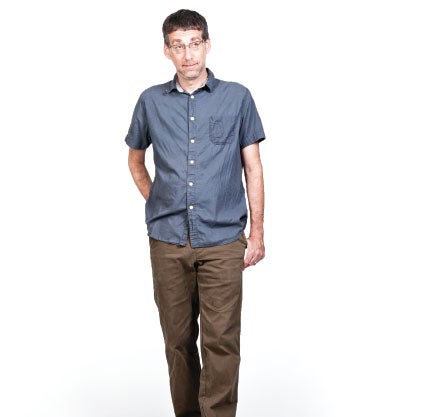A lot has changed on campus since 1998, when Larry Krasnoff started teaching philosophy at the College. However, one thing has remained the same during his tenure: a passion for teaching and introducing students to logic and philosophy. We caught up with Professor Krasnoff between classes to learn more about his hometown, the value of a philosophy degree and his love of softball.
You grew up in Philadelphia, which has a distinct character. How did Philly shape your approach to philosophy? A distinct character? You mean dirty, corrupt … that sort of thing? That doesn’t sound like a good approach to philosophy.
But you probably know something about being a sports fan in Philadelphia. We lose way too much, we care way too much and so we boo – even our own team. Especially our own team. So you learn: Life is mostly about losing, but you should never accept it. That sounds like a piece of philosophy to me.
Do you get tired of defending why a philosophy degree matters? I am not tired, because most people have already made up their minds against a philosophy degree. I don’t need to argue much if no one is listening anyway.
But the argument is really simple, looked at either intrinsically or extrinsically. Intrinsically, philosophy matters if reflecting on what matters in life matters, because that is what philosophy really is. Extrinsically, philosophy is just a serious liberal arts undergraduate degree, and the main path to being very well-off in our economy is to get a serious liberal arts undergraduate degree and then an advanced, professional degree. A pre-professional undergraduate major will get you a better job right away, but a philosophy major can be better combined with nearly any advanced degree, and then the economic outcomes are going to be reversed. In fact, it’s not even close.
You’ve done a lot of research on Hegel. What should the average person know about German idealism? The average person, especially in America, hears a lot of political talk about freedom. The average person should know that if our talk about freedom is going to make any sense, it is only because the German idealists thought really hard about what freedom means. We should try to think at least a little harder, too.
What one philosopher should every person know? Socrates, of course, because none of us would know any philosophy if it weren’t for him. He wanted the people he met to ask themselves whether they had any real justification for the things they said and did. Philosophy is still thinking about how to respond to that kind of challenge.
How has your approach to teaching changed over the years? I used to worry a lot more about what to ask to get students talking. Now I just come in and say what I think is important to the author of the text we are reading, and the students just talk a lot more in response. Teachers who are thinking primarily about what students will find interesting aren’t really teaching, and aren’t really interesting either. I am really old-school about education in the humanities. The books are the teachers, and my job is to get them to talk. Then everyone will be interested.
What school of philosophy claims you? My work is about the foundations of liberalism. I’m a liberal in politics, and I want to understand how that can be justified.
If you could debate one philosopher, who would it be? If the philosopher’s work annoyed me that much, I wouldn’t want to debate that person.
If you could give an incoming student one piece of advice on being successful at the College, what would it be? Show up, pay attention, read. It doesn’t actually have to be that hard.
You’re an avid softball player. What do you prefer: offense or defense? Everyone loves to hit. So of course the answer is defense: It’s more fun when you can take a hit away from the other team. Besides, your bat is just a weapon, a tool. Your glove is your friend.
What is your favorite object in your office? Before we moved to Charleston, we lived in Portland, Ore., and I keep our old license plate in my office. Students often notice it. Oregon has one of the most distinctive and best plates, with a pine tree against a backdrop of snowy mountains. It reminds me of living in Portland, where they do so well thinking about quality of life. Charleston is quite good in that respect, too, but we are still slacking off on the bike paths.
What is your guilty-pleasure TV show? There are so many high-quality TV shows on these days that you don’t even have to feel all that guilty. My wife and I have been watching The Americans, which just ended its third season. I think it’s the best show out there, but there are still plenty of guilty pleasures in the cultural references. Outlandish wigs! Ronald Reagan! General Zhukov! Strat-O-Matic football!
What is your favorite philosophy joke? Attributed to Groucho Marx: “These are my principles! Of course, if you don’t like them, I have others …”!
What book is currently on your nightstand? A cookbook by the Israeli-British chef Yotam Ottolenghi. I haven’t made nearly enough from it yet.
If you could see any musician right now in concert, who would it be? I would go to see Elvis Costello doing anything he ever decided to do, because he has probably done more than anyone else out there.
Describe yourself in one word. Intellectual (sigh).




